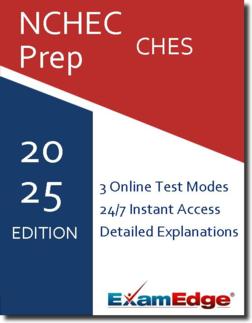NCHEC CHES (CHES) Practice Tests & Test Prep by Exam Edge - Test Reviews
Based on 40 Reviews
- Real Exam Simulation: Timed questions and matching content build comfort for your NCHEC CHES test day.
- Instant, 24/7 Access: Web-based NCHEC Certified Health Education Specialist practice exams with no software needed.
- Clear Explanations: Step-by-step answers and explanations for your NCHEC exam to strengthen understanding.
- Boosted Confidence: Reduces anxiety and improves test-taking skills to ace your NCHEC Certified Health Education Specialist (CHES).

NCHEC CHES (CHES) Practice Tests & Test Prep by Exam Edge - Review
NCHEC Certified Health Education Specialist - Reviews
Excellent
Based on
200
reviews
“ I PASSED MY MCHES EXAM!!! I ordered the materials 10/2/20 and passed my exam 10/16/20. This was a great birthday present to me and for me. Thank you so much!!!
Brittany , Wilmington, Delaware
See why our users from 154 countries love us for their exam prep! Including 40 reviews for the NCHEC CHES exam.
Exam Edge is an Industry Leader in Online Test Prep. We work with our Institutional Partners to offer a wide array of practice tests that will help you prepare for your big exam. No Matter how niche field of interest might be, were here to help you prepare for your test day.
| 2.8M | 4.5M | |
| Users | Tests Taken | |
| 100K | 19 | |
| Unique Exams | Years in Business | |


